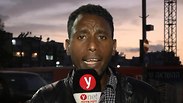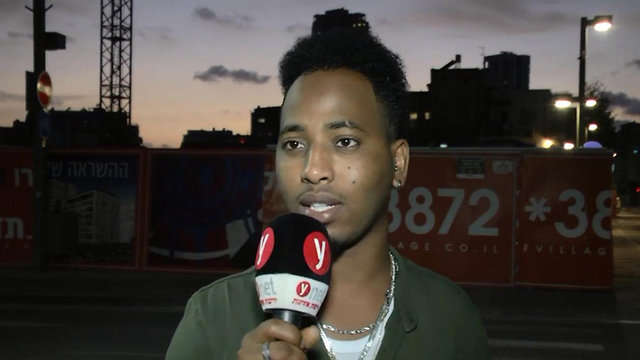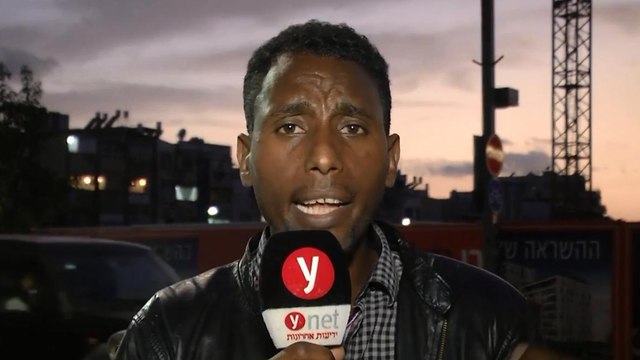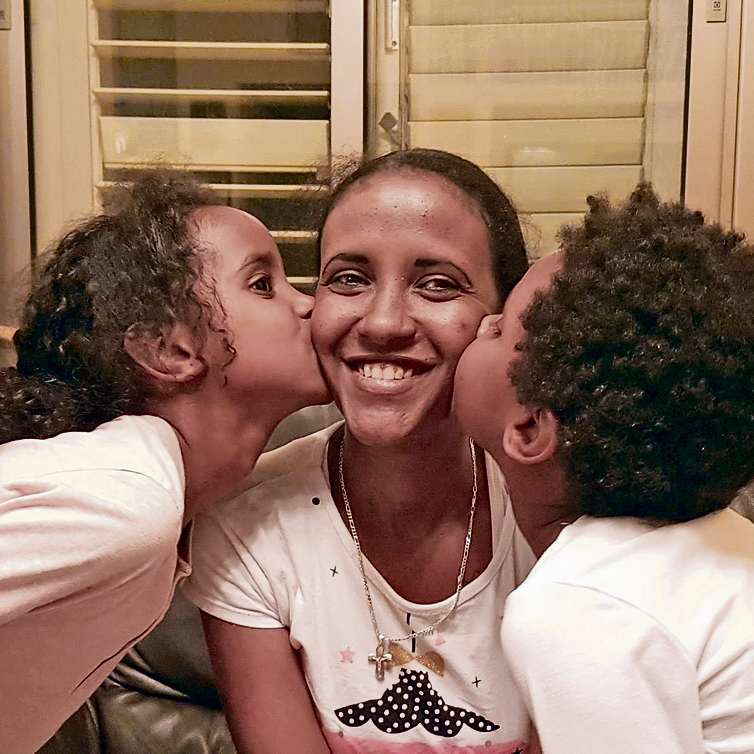

Asylum seekers to Netanyahu: 'Let us live like human beings'
On Monday, asylum seekers' joy was quickly replaced with trepidation after Netanyahu reneged on UN outline that would've given them legal status In Israel and other Western countries; 'My friends were deported and killed in Libya, I don't want to go there,' says Michael Mahari.
African asylum seekers' joy on Monday afternoon was quickly replaced with heavy concerns in the evening after Prime Minister Benjamin Netanyahu decided to suspend and eventually cancel an agreement with the United Nation High Commission for Refugees, which would have provided legal status to about half of them in Israel.
The asylum seekers are now worried about being deported against their will to African countries, while Netanyahu and the ministers in his government intend to legislate a law bypassing the High Court of Justice.
Michael Mahari, 23, who came to Israel from Eritrea 2.5 years ago, spoke about how he felt during that turbulent day. "When Netanyahu spoke on Monday, I was so happy, but then I felt bad again," he said.
"I escaped Eritrea because they wanted me to go to the army at the age of 14. I couldn't be there. I ran thinking I'll be better, but now my life is not that good," he recounted. "I want us to have a good life in Israel, to be provided with what we need."
Mahari said he's afraid of being deported to Africa. "I can't go back to Eritrea, they will just take me to the army and I can't," he added. "My dad is still there. I want to study, to open my horizons. I will not be accepted in any other African country. A while ago my friends went there and their money was taken. They were killed on their way to Libya, I don't want to go there."
He was angry at the prime minister for revoking the agreement. "It's his country, I can't tell him what to do, but I ask him to allow us to live like human beings. We are all human beings, we are all the same, black or white—we have the same heart, this is my belief."
Johny Cappel, 30, who came from Eritrea, now runs a kindergarten in southern Tel Aviv. "I've been in Israel for nine years, and I came here because Eritrea has an unlimited recruitment policy: you are a slave your entire life. I left my parents, my brothers and my family, because I had seen the massive damage done to my country. You give your life to your country, but you get no rights. That made me an asylum seeker. So in 2009 I fled from Eritrea to Ethiopia. I continued to Sudan, where I couldn't stay since Sudan could have deported me back to Eritrea. After a few years, I was kidnapped and brought to Sinai. In Sinai you have to pay," he told Ynet.
Cappel, like many other asylum seekers, was content with the agreement. "I heard on the news the prime minister saying that the deportation was canceled and that 16,000 asylum seekers will move to Western countries. On the one hand that made me happy, on the other hand, it didn't, since we were in bad shape. We spent our days in fear, we demonstrated. All this time we have worked hard, had difficulties and never thought we'd be surprised, that we'd be happy. On Monday we were happy," he said.
But the joy didn't last long. "After 6 hour and 45 minutes, the prime minister heard all the right-wing people (and changed his mind). I don't know why, it's just a shame and some sort of a game, and all while celebrating the common holiday to Jews and us Christians, when the story of the slaves of Sinai is told. We were very disappointed to hear the decision made was canceled, it was very hard to hear. All we ask is for him (Netanyahu) to reconsider, to make a clear-cut decision," Cappel continued.
Now, Cappel feels his life is in danger again. "My concerns are not new, they have existed since I came to Israel. You are illegal, you have no future, you don't have a normal life like everybody else has. You don't have work permits, a driver's license, you can't study. The minute one is illegal, one lives constantly in fear," he explained.
El-Haj Hassan, a Sudanese asylum seeker who has been living in Israel for 10 years, told Ynet he too was happy to hear of the UN outline, "but when came morning, he (Netanyahu) withdrew from his decision. And now we are used as pawns in his political game. But this is a humane issue, not a political one. We have been here for ten years, but no solution was offered."
"I petitioned for asylum five years ago, and then I was incarcerated for 18 months and then released. The government is just not interested in solving our problem," he lamented.
Hassan supports the idea of being resettled in safe Western countries, "but if they decide to send us back to the countries we came from, it would suggest the Israeli government ignores the crisis in those countries and supports the Sudanese and Eritrean governments."
"We've still got hope that the Israeli public will stand with us, we'll continue protesting with all the means we have. We thank everyone who supports us in this humane moral conflict," added Hassan.
Kibbutz Movement takes in asylum seekers
The Kibbutz Movement has decided not to wait for the prime minister's decision and is vigorously preparing for the absorption of the asylum seekers in dozens of kibbutzim across the country.
To date, dozens of refugees have been absorbed in kibbutzim throughout the south and north of the country, and many other kibbutzim are due to take part in the project.
"I aspire to reach 100 absorbing kibbutzim. But only once the school year ends, during summer break, a full absorption process will be possible," said Dr. Avi Offer, the Kibbutz Movement's coordinator.
Only two weeks ago, the first out of four Eritrean families—28-year-old mom Latina and her nine- and seven-year-old daughters Michal and Yerushalem—were absorbed in Kibbutz Sasa in the Upper Galilee.
"We lived in terrible overcrowding and in bad conditions in southern Tel Aviv, I worked as a cleaning lady, and I couldn't provide for us, it was so difficult," said Latina.
"But today I'm glad and thankful to the kibbutz for taking me in. At first, I was afraid of the unknown, I Googled Sasa and thought it's in Lebanon, but then I was told it's in Israel. I left a whole community, but today I feel good, my daughters are smiling, and we have found a warm loving home."
And Sasa is not the only kibbutz to take in the refugees. The head of the Upper Galilee Regional Council, Giora Zelt, said that 12 out of 29 kibbutzim in the regional council—among them Kibbutz Bar'am, Yir'on, Shamir, Lehavot HaBashan and Mahanayim—are preparing to absorb the asylum seekers.
"We don't need Netanyahu's statements, and the deportation isn't relevant to me," added Zelt. "A certain amount of refugees have already been absorbed, and obviously we have to properly prepare the schools and workplaces, exactly as we prepared to absorb the immigrants from the former Soviet Union. One of our most important values is to help the foreigner, the orphan and the widow."
The Kibbutz Movement said it wasn't bothered by "Netanyahu's statements about moving the asylum seekers to the kibbutzim."
"Over two months ago, we said we were willing to be part of any national solution to the asylum seekers' problem in southern Tel Aviv. We said it, and we've done it. But so far, no governmental representative has turned to us, and no plan has been presented."
But not all kibbutz members think the same, and there are some that look at the refugee absorption as long-lasting tragedy.
"On the one hand, I feel sorry for them, but on the other hand, it scares me to bring in a stranger. Most of them are not Jewish and have different customs," said 60-year-old Amiran Shuster from Kfar Szold.
"Eventually, they will not have anyone to marry and built a family with, which is not a good thing to the Jewish people. Now we are being portrayed as the saviors of another nation, but in the long run we'll have to pay the price. This will eventually empower minorities among us and change our country's demographics," according to Shuster.


















